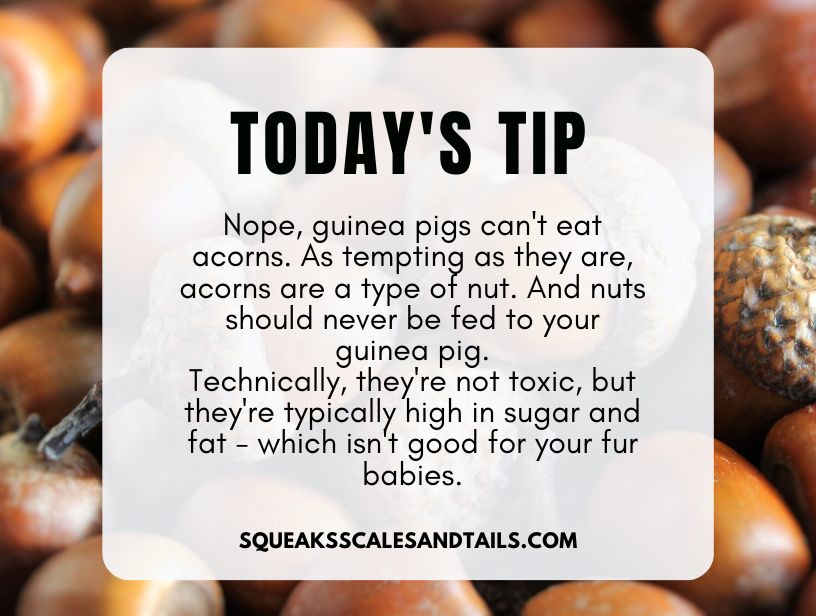Can Guinea Pigs Eat Acorns? (A Delicious Treat or a Dangerous Snack?)
If you’ve ever wondered about treating your fluffy friend to some acorns, hold your horses. Let’s dive into why acorns aren’t a good idea for our squeaky pals and what foods will keep them wagging their little tails:
Can Guinea Pigs Eat Acorns? (Nope, Sorry!)

Nope, guinea pigs can’t eat acorns. As tempting as they are, acorns are a type of nut. And nuts should never be fed to your guinea pig.
Technically, they’re not toxic, but they’re typically high in sugar and fat – which isn’t good for your fur babies.

Risks of Feeding Acorns to Guinea Pigs
So, what’s the big deal? Why should you keep acorns clear of your guinea pig’s food dish? Well, here’s why.
1. They’re High in Fat. Fat = Health Problems.
Guinea pigs are prone to obesity when overfed, and foods high in fat should be avoided. Acorns – like most nuts – are packed with fat. Feeding them to your little friends can lead to weight gain and health problems. Problems like:
- diabetes
- bumblefoot – a condition that can cause joint inflammation and makes it hard for your guinea pig to walk
- heart disease
- lack of energy

To keep your little friends slim and trim, be sure to feed them hay, fresh vegetables and a small portion of quality pellet food.
2. They’re a Choking Hazard
Acorns are also a choking hazard for guinea pigs. Their small size means that they can easily get stuck in a guinea pig’s throat, which can be very dangerous.
3. They Can Cause Intestinal Obstruction
Another problem that can occur if a guinea pig eats an acorn is intestinal obstruction. Acorns are very hard and can cause blockages in the intestines, which can be life-threatening.

You might also be interested in: What Guinea Pigs Can Eat (Everything You Need to Know) and Can Guinea Pigs Eat Acorn Squash? (The Truth Revealed)
4. Acorns Are Hazardous to Your Guinea Pig’s Health
Tannic acid is a big no-no for our fluffy guinea pig friends. And guess what? Acorns have it in spades. If your guinea pig eats one, they could suffer from upset stomach, or worse, liver damage. Stick to the salad bar, guys.
5. There Are Better Foods for Guinea Pigs
Let’s be real, there are WAY better foods out there for your guinea pig anyways. Like hay. Or fresh veggies? Or even those fancy pellets designed specifically for their little tummies?

Acorns are a no-no for guinea pigs. They’re high in fat, can be a choking hazard, and contain tannic acid which could cause stomach upset or even liver damage. There are plenty of other better options for your guinea pig to enjoy, like hay, fresh veggies and specially formulated pellets. So keep the acorns off the menu.
Acorn Alternatives for Guinea Pigs
Here’s a delightful table showcasing a variety of fruits and veggies that guinea pigs can enjoy:
| Veggie / Fruit | Why It’s Better Than Acorns for Guinea Pigs |
|---|---|
| Carrots | Crunchy and packed with vitamin A for healthy eyes and skin. |
| Bell Peppers | Colorful and rich in vitamin C to boost their immune system. You can feed this to them every day. |
| Spinach | Popeye’s favorite! Provides iron and other essential nutrients. Just feed in moderation. Spinach has lots of calcium, which can cause bladder stones. |
| Cucumber | Refreshing and hydrating, perfect for hot summer days. |
| Blueberries | Tiny bursts of antioxidants to keep your piggies feeling fresh. |
| Romaine Lettuce | Leafy goodness that adds fiber and vitamins to their diet. |
| Apples | A juicy treat! High in fiber and vitamin C. |
| Strawberries | Sweet and tangy, packed with vitamin C and antioxidants. |
| Celery | A crunchy snack that helps keep their teeth healthy. |
| Watermelon | Super hydrating and a sweet treat to beat the heat. |
Why settle for acorns when there’s a whole smorgasbord of fruits and veggies to tantalize your guinea pigs’ taste buds?
These options not only provide a delightful variety of flavors, but they also come with a range of nutritional benefits to keep your piggies in tip-top shape. Plus, let’s face it, they’re way more exciting than those boring ol’ acorns.
References
Nutrient requirements of the Guinea pig – Nutrient requirements of laboratory animals – NCBI bookshelf. (n.d.). National Center for Biotechnology Information. https://www.ncbi.nlm.nih.gov/books/NBK231932/
